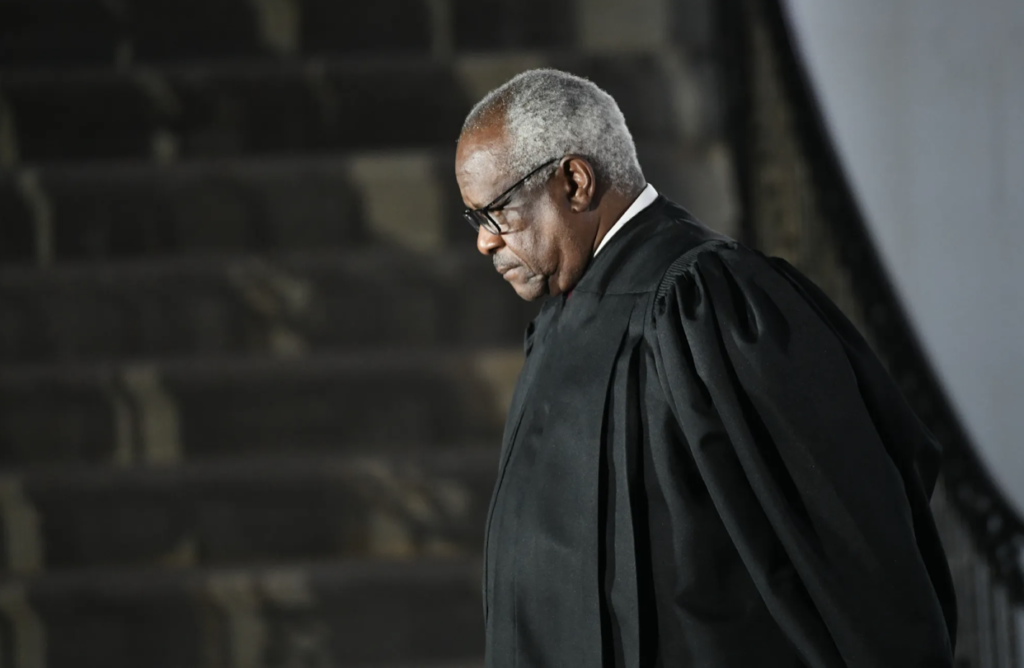Justice Clarence Thomas Exposed After Accepting Gifts

Imagery courtesy of Vanity Fair
By Madeline Bartol
Supreme Court Justice Clarence Thomas has come under fire recently for not properly reporting his financial disclosure forms. Thomas, who has been on the Supreme Court since 1991, has reportedly accepted luxury trips and has been claiming thousands of dollars from a shuttered real estate firm, as discovered by ProPublica.
The law requires members of Congress, Supreme Court Judges, and almost all federal judges to claim gifts they have received. Thomas, however, has been failing to disclose certain gifts for over the past two decades, saying that he did not know these trips needed to be reported.
Most of these luxury trips and property acquisitions were funded by billionaire Republican donor Harlan Crow. It is reported that Thomas made good use of Crow’s private jet and yacht, using it many times over the years. The government requires Judges to report any travel that was not provided for them by the United States government or a foreign government while in that country. Thomas did not report any private jet trips in his financial disclosure form. Crow also bought three Georgia properties from Thomas, but Thomas never reported the transaction. One of these houses being where Thomas’s mother presides. After the house was bought, it underwent renovations that cost tens of thousands of dollars.
Crow also bought the Georgia home where Thomas’s mother lives in. Thomas was also claiming income from a defunct company, Ginger Ltd., Partnership. This company, started by relatives of his wife and his wife, opened in the 1980s but was closed down in 2006. However, Thomas has been claiming income from this company since then. In 2021, he reported receiving an income between $50,000-$100,000 that year from his interest in the company, even though the company no longer exists.
However, this is not the first time Thomas has come under fire for incorrect financial disclosure forms. In 2011, he was made to update these forms, and again in 2020 when he did not report two trips made to different law schools for speaking events. Thomas commented on the 2011 case, saying he “inadvertently omitted due to a misunderstanding of the filing instructions,” and he later amended these mistakes after they were reported.
There is debate, however, if all of these are considered gifts or “personal hospitality.” Crow makes the distinction that Thomas did not have to report it because he did not seek out these experiences given by him; it was how he would have treated any one of his friends. The law on this is very broad, which leads many to have the opinion that this is acceptable to do, and for, the Guide to Judiciary Policy gives a lot of exceptions to the rules on accepting gifts.
Some who take the side of Thomas agree that this law is confusing.
One judge who chose to stay anonymous said, “Hospitality was never defined, and it seemed odd to think of a situation where you are spending social time with a close friend where at least occasionally some transportation doesn’t get involved.”
Thomas has even commented claiming that he misunderstood what he needed to document.
Many people familiar with this law do not believe that this is the whole story.
Stephen Gillers, a legal ethics expert at New York University, says, “Any presumption in favor of Thomas’s integrity and commitment to comply with the law is gone. His assurances and promises cannot be trusted. Is there more? What’s the whole story? The nation needs to know.”
There have been calls to investigate these financial forms by both Congress members and legal experts. A Judicial Conference has been called by members of Congress in hopes of referring him to the Attorney General’s office for investigation. Chief Justice John Roberts also agrees with this sentiment of wanting to examine the conduct of Justice Thomas.








